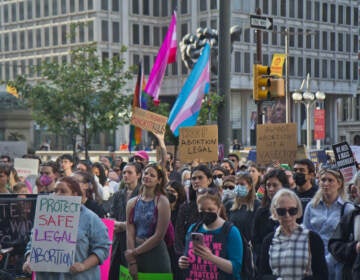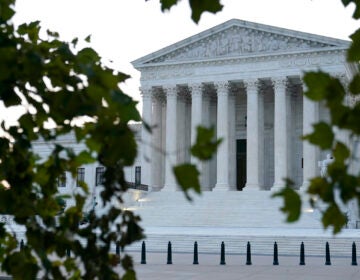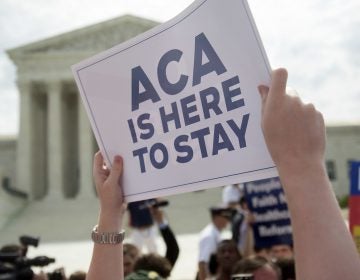Supreme Court contraception ruling would disproportionately affect low-wage workers
Pregnancy prevention is just one reason birth control is used. The ACA included the mandate after a women’s health panel deemed providing it essential.

In this Aug. 26, 2016, file photo, a one-month dosage of hormonal birth control pills is displayed in Sacramento, Calif. (AP Photo/Rich Pedroncelli)
Women’s health care and economic mobility suffered a potentially enormous blow on Wednesday when the U.S. Supreme Court ruled in favor of a Trump administration regulation expanding the scope of employers that are exempt from the Affordable Care Act’s mandate to provide free birth control to workers.
The court ruled, 7-2, that any privately held company can legally deny employees contraception if that employer objects to birth control on religious or moral grounds. Justices Ruth Bader Ginsburg and Sonia Sotomayor dissented.
Pregnancy prevention is just one reason women use birth control — it is also used for health care purposes ranging from reduction of menstrual pain to treatment of acne and endometriosis. The ACA included the contraception mandate at the advice of an expert panel on preventative care that deemed it essential.
A large body of literature indicates that increased access to contraception decreases the chance women will live in poverty. When they have affordable birth control, women attain higher levels of education and earn more in the labor force.
Indeed, after the implementation of the ACA and the contraception mandate, out-of-pocket spending on the birth control pill decreased dramatically and quickly. According to the Kaiser Family Foundation, in 2012 more than 20% of insured women reported spending some amount on oral contraception. Four years later, just 2% did.
The mandate also made women more likely to use long-acting contraceptives such as IUDs and implants, which are more effective but cost more up front, making them more attractive options when covered by insurance.
As women are forced to seek contraception elsewhere, out-of-pocket costs will likely increase — a problem that Justice Ginsburg argued was exactly what the ACA sought to avoid.
“If it turns out that there’s no other plan that covers them, then they’re not covered. And the only way for them to get the contraceptive services is for them to pay out of pocket,” she said during oral arguments. “Precisely what Congress did not want to happen in the Affordable Care Act.”
Those burdens are disproportionately borne by low-wage workers, often workers of color, who rely on employer-provided plans and would not be able to afford high costs of paying for contraception themselves. Those groups face dramatic health disparities already, and the coronavirus pandemic has only exacerbated those inequities.
“Certainly if low-wage workers find themselves having to decide between paying for their birth control or paying rent and feeding their families, the tradeoff before the ACA tended to go paying their rent and paying for food and forgoing their contraception,” said Christine Castro, an attorney with the Pennsylvania Women’s Law Project, which supported the State of Pennsylvania in its lawsuit against the federal government over the Trump administration’s regulations.
Like so many efforts on behalf of the administration, Castro said, the Supreme Court’s ruling works to weaken the Affordable Care Act by making virtually any employer with a broadly defined “moral” argument for denying coverage eligible for an exemption.
“You could hypothetically just have an employer who has a moral belief that a woman’s place in society is at home and not in the workforce, and based on that belief could raise the objection,” she said. “That’s just how broadly it could be interpreted.”
The high court’s decision also came as a blow to Pennsylvania, which with New Jersey sued the Trump administration for what it viewed as a violation of the Affordable Care Act, and for implementing the new rules without a proper public process.
“Since the day they took office, the Trump administration has been dead set on hacking away at the Affordable Care Act,” Attorney General Josh Shapiro said in a statement responding to Wednesday’s ruling. “So long as I serve the people of Pennsylvania, I will continue to fight for people’s right to health care and reproductive justice.”
“We are disappointed by today’s Supreme Court decision on contraceptive coverage in PA v. Trump,” New Jersey Attorney General Gurbir Grewal said in a statement. “But we’re proud to stand up for women’s access to affordable health care, today and every day, and will continue to fight for what’s right.”
The ACA always offered houses of worship exemptions from its mandate that employers cover birth control. In 2014, the Supreme Court ruled in Hobby Lobby v. Burwell that closely held organizations should also be exempted if they had sincere beliefs in conflict with the mandate. That brought religiously affiliated nonprofits, schools and universities — including those offering student health plans — into the fold.
To accommodate that ruling, the Obama administration came up with an opt-out provision, allowing those religiously affiliated groups opposed to contraception to advise the Department of Health and Human Services that this was the case. In turn, HHS would connect their employees directly with an insurer to offer contraception, and the employer would be off the hook.
But the Little Sisters of the Poor, an international order of Catholic nuns, maintained in a lawsuit that even that accommodation infringed on their religious beliefs since it would force them to be complicit in aiding people in accessing contraception coverage, which goes against their conscience.
Wednesday, the Supreme Court agreed with the religious order, effectively striking down the opt-out provision and allowing any for-profit or nonprofit entity that is not publicly traded to be exempt on moral or religious grounds.
“We hold that the Departments had the authority to provide exemptions from the regulatory contraceptive requirements for employers with religious and conscientious objections,” Justice Clarence Thomas wrote in the majority opinion.
The ruling kicks the matter back down to the federal district court, which will now decide whether the Trump administration acted too hastily in implementing the expanded exemption rules — a procedural question that is separate from whether the rules themselves violate the ACA.
“While I am disappointed with much of the majority opinion, I am pleased the Court allowed our challenge to the Administration’s overly broad rules to proceed,” wrote Shapiro. “We now return to the lower courts to address whether the exemptions are arbitrary and capricious. This fight is not over.”
In the meantime, the high court’s opinion instructs the lower court to lift a nationwide injunction in place to prevent the exemption from being implemented while the case was being argued.

Get daily updates from WHYY News!
WHYY is your source for fact-based, in-depth journalism and information. As a nonprofit organization, we rely on financial support from readers like you. Please give today.






